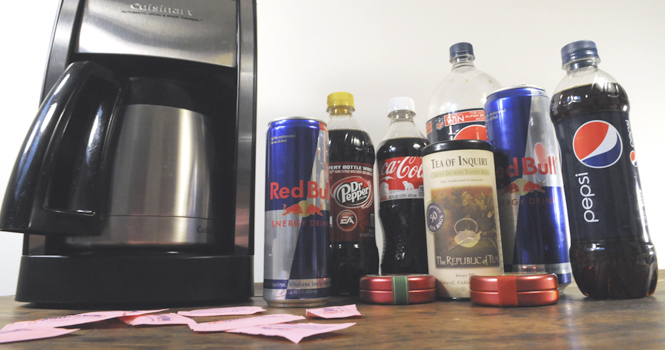Are you living in a caffeine dream?
January 18, 2012
There’s a hidden ingredient in what you’re eating and drinking. Maybe it’s in your bowl of Cocoa Puffs or steaming hot coffee. Some abuse it, and some avoid it. It can be found in seeds, fruits and leaves. It’s caffeine, and it’s harmful in large quantities, but some students don’t care.
Zach Austen, senior political science major, said he has stopped keeping track of how much caffeine he consumes in a day because it is a lot, and his “poison of choice” is Dr. Pepper.
“Counting how much caffeine I drink just makes me feel sad,” Austen said. “On an average day, I probably have around six servings of Dr. Pepper, one energy drink and a small amount of chocolate. My caffeine intake is probably somewhere in the ballpark of 300 to 400 mg.”
He said when he does not drink caffeine for an entire day he experiences side effects that are similar to a hangover. It’s common for people to have a caffeine headache when taking a break from consuming a large amount.
“If I suffer more than 24 hours without a caffeinated beverage, I will be useless and irritable until someone hands me a Dr. Pepper,” Austen said.
Austen admitted he feels like he is slowly poisoning his body with the amount of caffeine he consumes, but it tastes delicious and keeps him awake.
“In terms of side effects, I think ignorance is bliss. Ignoring science allows me to remain guilt-free about maintaining my ridiculous caffeine habits,” Austen said. “I really drink the most caffeine in the morning, especially when I need to recover from the upsetting shock of my alarm at 7 a.m.”
Natalie Caine-Bish, professor of nutrition and dietetics, said that the average United States caffeine consumption is about four milligrams per day, which is much lower than other countries.
But most drinks that have caffeine like coffee, pop, energy drinks and some teas have more than 15 mg of caffeine per serving and most students at Kent State, like Austen, consume more than one serving.
Caine-Bish said one cup of brewed coffee provides 95 to 200 mg of caffeine. An eight-ounce serving of black tea has 40 to 120 mg of caffeine. An eight-ounce serving of green tea has 15 to 60 mg. Soft drinks, like Coca Cola, provide 20 to 80 mg in a 12 ounce serving. Energy drinks, such as Monster, typically have 48-300 mg per serving.
She said when it comes to pop, energy drinks, coffee and tea, it is hard to determine which is actually worse for the body.
“It depends on calories, fat and the amount of caffeine, as well as the serving size and the frequency of consumption,” Caine-Bish said.
She said anywhere from 500 to 600 mg of caffeine may cause immediate negative side effects like nervousness, irritability, upset stomach, fast heart beats and tremors. Most doctors and scientists do not use the term “addictive” when referring to caffeine because not everyone shows the same symptoms when they stop using caffeine, but she does believe the body gets used to consuming it daily.
She said when a habitual caffeine user stops drinking caffeine he or she will face negative symptoms that last two to nine days, and they become less severe after 48 hours. Not everyone has the common “caffeine headache” or grogginess when he or she does not consume any caffeine.
“Having two or three cups of coffee a day or some type of cola is moderate caffeine intake, so as long as you are under those guidelines, it is fine,” Caine-Bish said. “Just remember the kcals, fat and sugar that may be associated with these products can cause other health concerns such as obesity or cardiovascular disease.”
Nate Hooks, senior architecture major, said he mainly drinks soda and energy drinks like Redbull, Monster, Rockstar and NOS but he does not experience any “addictive” side effects.
He said if he does not drink any caffeine he does not experience headaches, and it does not effect his day. He said in his case he does not think his caffeine consumption is an addiction because there are times when he rarely drinks caffeine, like in the summer. Most of his caffeine consumption is during midterms and the last two weeks of the semester.
“I really only drink it when I have to stay up really late and wake up really early,” Hooks said. “For other students, I see it as a problem that can lead to stronger substances like Adderall when energy drinks and other caffeinated products are no longer doing the job.”
Contact Maura Zurick at [email protected].












